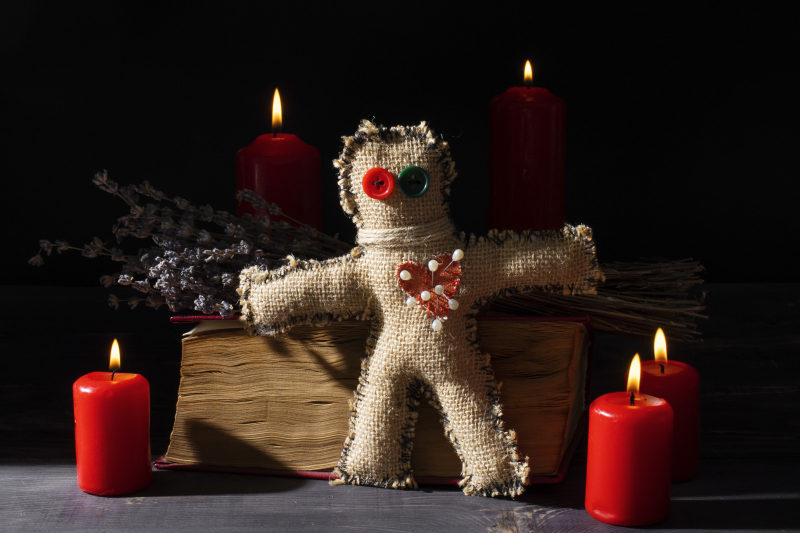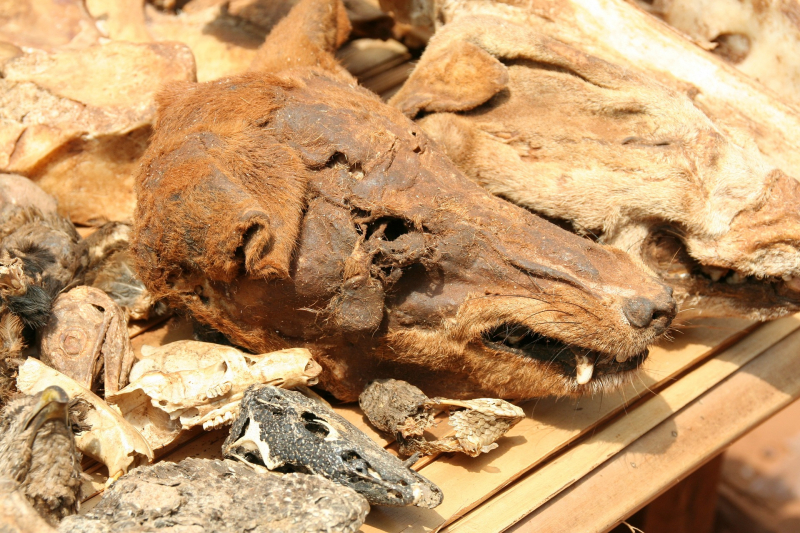Rituals and Practices of Vodou

Despite the fact that Vodouisants lack a structured theology that dictates how to practice Vodou, Haitian Vodou rites are crucial ceremonies for the faith. Rituals will differ from place to place, but many themes will remain consistent.
Haitian Vodou rituals might take the form of individual house ceremonies or big communal festivities. The ceremonies are carried out and led by an Oungan, a male priestess, and a Manbo, a female priestess.
These religious leaders direct the dancing and chanting during communal rites, and it is believed that they are bestowed with their title after being visited by a lwa.
During religious rites, believers may enter a trancelike state in which they may eat and drink, perform stylized dances, give supernaturally inspired advice to people, or perform medical cures or special physical feats; these acts demonstrate the incarnate presence of the lwa within the entranced devotee.
Appealing to the lwa, or spirits, and inviting them to briefly take possession of (or "ride") human bodies so that they might communicate directly with believers are frequent Vodou religious activities. Drumming, singing, dancing, and the drawing of symbols known as veves (vevers) are common elements of the ceremonies.
Vodou ritual action aims to refine and restore balance and vitality in connections between people and between people and the spirits of the unseen world. A ceremonial dance will take place, complete with elaborate masks or face paint. Drums, in particular, will be used to draw the LWA's attention. The ritual attempts to win possession from the lwa as well as favor or protection from the spirits.
Spirit possession, a key part of Vodou worship, is important in Afro-HHaitian religion, as it is in many other religions around the world. Possession is one of the religion's least understood aspects. Possession confirms both the LWA and the community. Possession, on the other hand, is a moment when the lwa connect in a physical way with humans, who obtain answers to critical questions during such times.
Papa Legba is the guardian spirit who facilitates connection between the lwa and the devout, according to folklore. By allowing the LWA to pass, he has influence over whether or not a possession occurs.
Papa Legpa is traditionally depicted in the Vodou religion as a feeble old guy clad in rags and smoking a pipe. He walks with a cane since it is believed that he exists in two worlds at the same time: the spiritual and the mortal.
Veves are Haitian Vodou symbols. Each LWA has its own symbol, and some have several symbols associated with them. Rituals typically involve the painting of special symbols known as veves. Veves are drawn on the ground with cornmeal, sand, or other powdery things and destroyed throughout the rite.
The veve utilized in a ceremony is determined by the lwa whose presence is requested. The names of the lwa as well as the designs of the veve differ according to local customs. However, several vegetables frequently share elements. Damballah-WWedo, for example, is a serpent god; hence, his veves frequently feature two snakes.
Participants will provide food for the LWA, including animal sacrifices. Depending on the lwa being addressed, a variety of animals may be killed during a Vodou rite. Animal sacrifices are frequently cooked and served as part of a community meal. It offers spiritual sustenance for the LWA. After the gods have had their fill, the faithful can dine. Food plays an important role in this religion and its sense of community.
The calendar of ritual feasts is syncretized with the Roman Catholic calendar. Important lwa are celebrated on saints' days. For example, Ogou on St. James' Day, July 25; Ezili Danto on the feast of Our Lady of Mount Carmel, July 16; Danbala on St. Patrick's Day, March 17; and the spirits of the ancestors on All Saints' Day and All Souls' Day, November 1 and November 2.
Throughout the year, many more familial feasts (for the sacred children, the destitute, and specific ancestors) as well as initiations and burial ceremonies take place.






